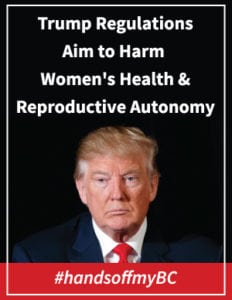 As part of its ongoing attack on women’s access to health care, the Trump administration recently issued interim final rules that radically undercut the contraceptive coverage provisions implemented through the Affordable Care Act. The rules, which are effective immediately, allow employers or educational institutions that do not agree with the use of contraception to impose their personal religious or moral beliefs on their employees or students by refusing to cover contraceptive services in their health plans. Women’s health and reproductive autonomy are seriously jeopardized.
As part of its ongoing attack on women’s access to health care, the Trump administration recently issued interim final rules that radically undercut the contraceptive coverage provisions implemented through the Affordable Care Act. The rules, which are effective immediately, allow employers or educational institutions that do not agree with the use of contraception to impose their personal religious or moral beliefs on their employees or students by refusing to cover contraceptive services in their health plans. Women’s health and reproductive autonomy are seriously jeopardized.
The ACA requires most new health insurance plans to cover certain preventive services for women without cost sharing. The Health Resources & Services Administration (HRSA) has defined these services to include all FDA-approved contraceptive methods and sterilization procedures, as well as patient education and counseling.
Under the previous rules, there were three categories of entities that, due to their religious beliefs, were permitted to offer health plans that do not cover some or all FDA-approved contraceptive methods. First, health plans established or maintained by religious employers, such as churches, church associations, or other similar religious orders, were exempted from the coverage requirements. Women enrolled in these plans did not receive contraceptive coverage.
Second, the regulations contained an accommodation for religious non-profit entities with an objection to some or all contraceptives. The accommodation allowed these entities to provide a plan that did not cover some or all FDA-approved methods but ensured that women who work or study at such entities had access to no-cost contraception. Generally, the insurance issuer or a third-party administrator assumed responsibility for providing the contraceptive coverage directly to plan enrollees.
Third, in response to the Supreme Court’s decision in Burwell v. Hobby Lobby Stores, Inc., the government extended the accommodation to some closely held for-profit organizations with a religious objection to contraception.
Despite the exemption and the accommodation, the contraceptive coverage requirement remained the subject of dozens of lawsuits. A number of religious entities entitled to the accommodation claimed that the accommodation process itself violated their religious freedom. In Zubik v. Burwell, the Supreme Court declined to rule on the merits of these claims, instead remanding the cases back to the lower courts with instructions that they assist the parties in reaching a solution that would account for the plaintiffs’ religious objections while also ensuring that women “receive full and equal health coverage, including contraceptive coverage.” However, the plaintiffs in Zubik and similar cases objected to all the solutions that were proposed, thus leaving the cases unresolved.
Enter the interim final rules, which break the exemption to the contraceptive coverage requirement wide open, totally appeasing the plaintiffs in the ongoing litigation and going even further. Under the rules, any non-governmental non-profit or for-profit entity and any college or university with a sincerely held religious objection to some or all contraceptive services can offer a plan that excludes coverage of some or all contraceptive services. Similarly, a slightly narrower category of entities with a sincerely held moral objection to some or all contraceptive services can sponsor a plan that omits coverage of contraceptive services. Unlike the religious exemption, the moral exemption does not currently apply to for-profit entities that are publicly traded. However, the administration expressed its willingness to consider expanding the moral exemption to all for-profit entities, as well as non-federal governmental entities.
The interim final rules also allow a willing insurance company and/or employer or educational institution to offer a separate or different health plan – one that excludes coverage of some or all contraceptive services – to any individual with a religious or moral objection to contraception.
The interim final rules do not completely do away with the accommodation, but instead make the process voluntary for employers and educational institutions that qualify for an exemption. These entities can choose to make use of the accommodation and thus, facilitate access to contraceptive services for enrollees.
Needless to say, there are a number of uncertainties. What does it mean to have a moral objection to contraception? How many entities will invoke the exemption, and how many will choose to use the accommodation? Will enrollees receive adequate notice that their plans do not include coverage of some or all contraceptive services? What stops individuals and entities from citing the rules to exclude coverage of other things they object to, such as vaccines?
Even with all of these questions, this much is clear – the interim final rules will leave many women without access to contraception. These women will lose the ability to control their reproductive futures, and as a result, public health will suffer.
*HHS is accepting comments on the interim final rules. The deadline to submit comments is December 5, 2017.

